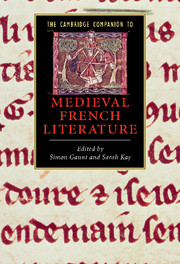Book contents
- Frontmatter
- Introduction
- Part I What is a Medieval French Text?
- Part II What is a Medieval French Author?
- 5 Chrétien de Troyes
- 6 The Châtelain de Couci
- 7 Guillaume de Machaut
- 8 Christine de Pizan
- Part III What is the Value of Genre for Medieval French Literature?
- Part IV How can we read Medieval French Literature Historically?
- Appendix: Reference works for Old and Middle French
- Bibliography of medieval French texts
- Suggested Further Reading
- Index
- Series List
7 - Guillaume de Machaut
from Part II - What is a Medieval French Author?
Published online by Cambridge University Press: 28 March 2009
- Frontmatter
- Introduction
- Part I What is a Medieval French Text?
- Part II What is a Medieval French Author?
- 5 Chrétien de Troyes
- 6 The Châtelain de Couci
- 7 Guillaume de Machaut
- 8 Christine de Pizan
- Part III What is the Value of Genre for Medieval French Literature?
- Part IV How can we read Medieval French Literature Historically?
- Appendix: Reference works for Old and Middle French
- Bibliography of medieval French texts
- Suggested Further Reading
- Index
- Series List
Summary
Armes, Amours, Dames, Chevalerie,
clers, musiciens, faititres en françois,
tous sophistes, toute poeterie,
tous ceuls qui ont melodieuse voix,
ceuls qui chantent en orgue aucune fois
et qui ont chier le doulz art de musique,
demenez dueil, plourez, car c'est bien drois,
la mort Machaut le noble rethorique.
(Eustache Deschamps, ballade 123, 1-8)(Men of arms, lovers, ladies, knighthood, clerics, musicians, writers of French, all philosophers, all of poetry, all who have a melodious voice, those who sing with accompaniment on occasion and hold dear the sweet art of music, show your grief, cry, because it is true, the death of Machaut, the noble poet.)
Composed soon after the death of Guillaume de Machaut in 1377, Eustache Deschamps’s lament attests to the tremendous legacy already afforded the master at the end of his life. As the author of over 400 poems, 117 songs, 23 motets, 13 dits, and the first full Mass cycle, the Machaut celebrated by Deschamps assumes legendary proportions as the master of lovers, knights, and ladies; musicians, poets, clerics, and philosophers. Subsequent generations rarely wavered in their celebration of Machaut. In the realm of music, Machaut is universally recognized as the last of the great poet-composers, the greatest practitioner of the musical style known as ars nova (characterized principally by a freer attitude towards rhythm than had been the case previously), the master of polyphony, and the first composer of a complete Mass. In literature, he is regarded as no less than the pater familias of French poetry. From René d'Anjou who considered Machaut second only to Ovid to Daniel Poirion who recognized him as a precursor of Malherbe, Machaut’s legacy was to have masterfully united the auctor of classical literature and the vernacular author, music and poetry, the clerkly and the courtly world.
- Type
- Chapter
- Information
- The Cambridge Companion to Medieval French Literature , pp. 109 - 122Publisher: Cambridge University PressPrint publication year: 2008
- 1
- Cited by

